#George B. Post
Photo

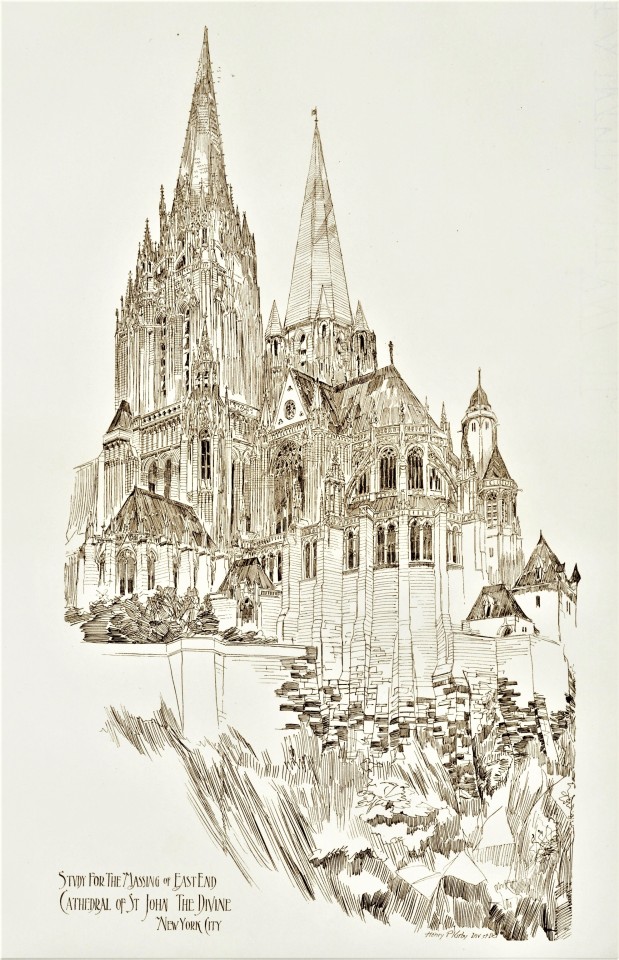
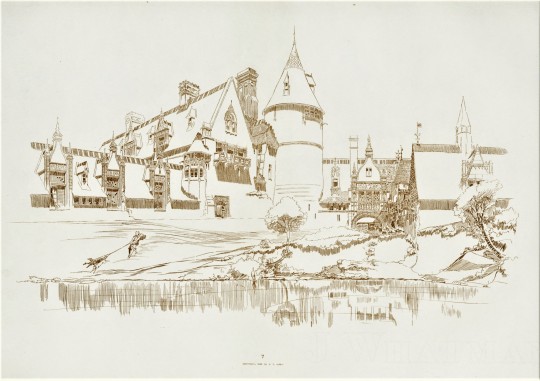
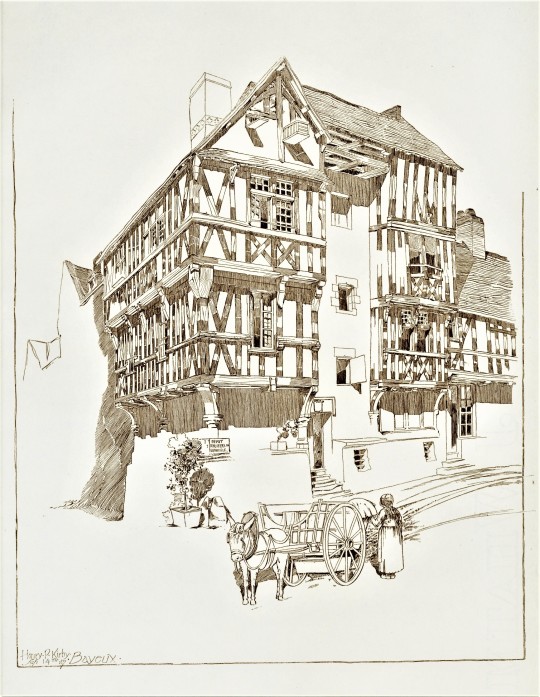
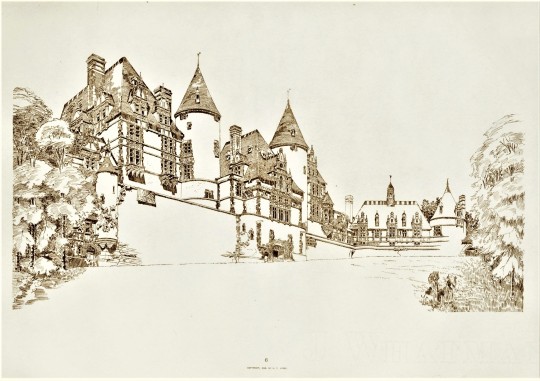
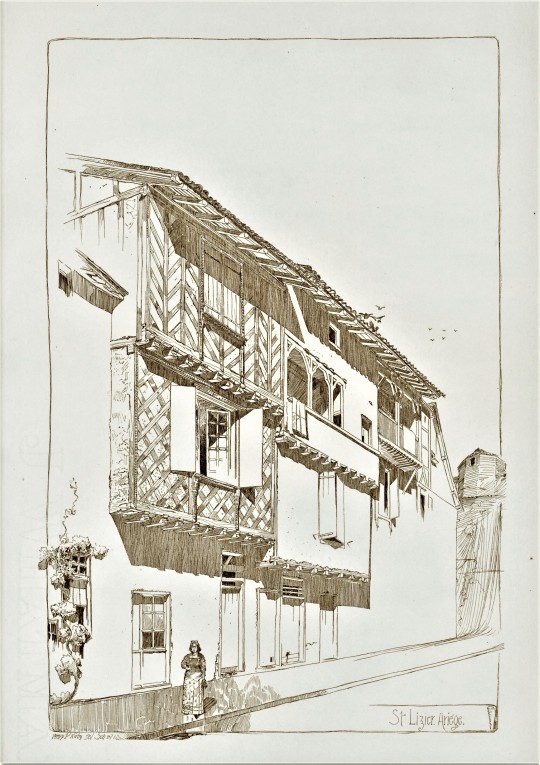

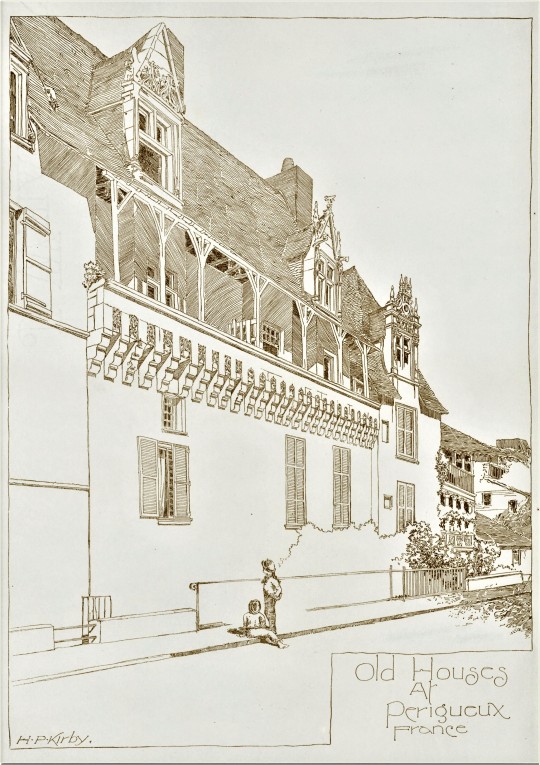
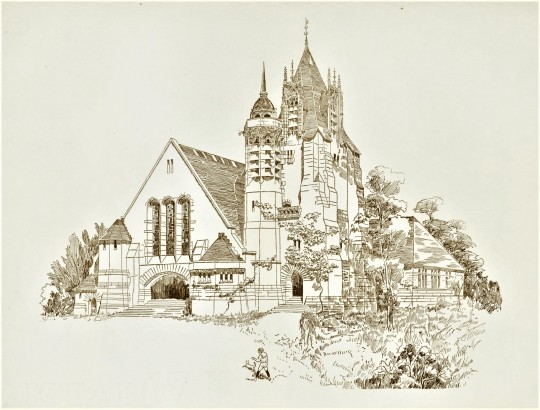
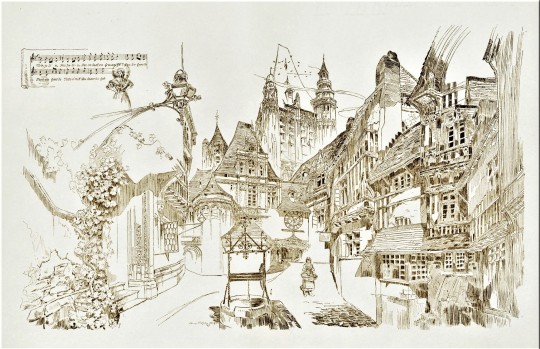
Decorative Sunday with Henry P. Kirby
These charming sketches are the work of New York architect Henry P. Kirby (1853 - 1915). Architectural Compositions contains fifty loose plates printed on Whatman paper and housed in a portfolio. It was published in Boston in 1892 by Bates, Kimball & Guild, publishers of one of the United State’s leading architectural journals of that time, The Architectural Review (Boston), not to be confused with the longer running Architectural Review still in publication out of London.
Kirby would have been working as a draftsman for George B. Post at the time of publication, for whom he later worked as lead designer before striking out on his own. Some of the subject matter also evokes Kirby’s time in France, where he studied at the École des Beaux-Arts after training with his father, also an architect. Per the subtitle, some of the sketches were “made in connection with actual projects,” while many were “the result of study during leisure moments.” I found Kirby’s eye for the human elements in his sketches particularly endearing, from the foreground figures to details on the buildings themselves, like open widows and overgrown foliage, or what looks like a duvet cover hanging out to dry (first image above).
For any music buffs reading, the final sketch includes some bars of "Très-jolie" from the opéra comique smash hit La Fille de Madame Angot.
Our copy of Architectural Compositions was gifted to UWM by Gustav A. Elgeti in 1966.
Find more Decorative Sunday posts here.
-Olivia, Special Collections Graduate Intern
#Decorative Sunday#Architectural Compositions#Henry P. Kirby#Henry Petit & Green#Bates Kimball & Guild#The Architectural Review#George B. Post#École des Beaux-Arts#La Fille de Madame Angot#decorative plates#decorative arts#beaux-arts#architecture#architectural drawings#architectural plates#olivia
422 notes
·
View notes
Photo








The New York Stock Exchange opened its first permanent headquarters at 10 - 12 Broad Street near Wall Street in New York City on January 4, 1865.
#New York Stock Exchange#headquarters#12 Broad Street#4 January 1865#NYSE#18 Broad Street#anniversary#US history#Lower Manhattan#USA#Classical Revival#Financial District#George B. Post#not this building#travel#2013#summer 2018#original photography#façade#exterior#vacation#tourist attraction#landmark#cityscape#John Quincy Adams Ward#Paul Wayland Bartlett#New York City
2 notes
·
View notes
Text
“average spirit medium gets accused of murder 3 times a year” factoid actually just statistical error. maya fey, who lives in capcom’s stock plot contrivance box & is accused 10,000 times a day, is an outlier adn should not have been counted.
#i know this joke has 100% been made before#however. am playing spirit of justice. thought ‘lol wouldn’t it b funny if the first time maya gets screentime in this trilogy’#‘she gets accused of murder’#fellas. you would not believe what happened next#ace attorney#bee post#maya fey#spiders georg#somebody free my girl from the capcom contrivance box. she deserves to go 5 seconds without someone dying mysteriously in her presence
118 notes
·
View notes
Text

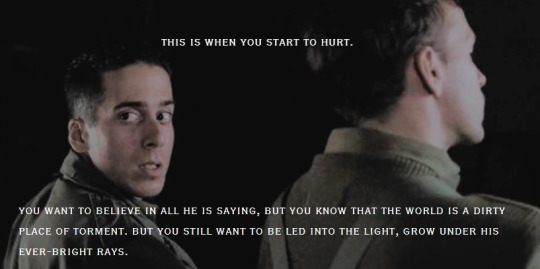


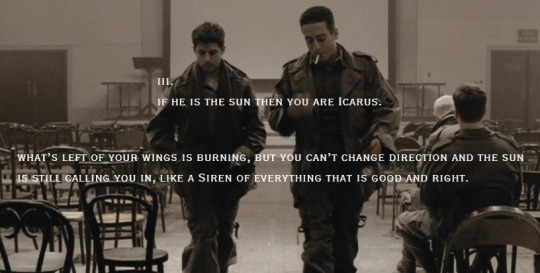


excerpts
#rie posts#sometimes you just gotta make a shitty ass edit with screencaps you've used thousands of times before guys yaknow#anyways i'm fine it's fine#but i cannot for the LIFE of me find the source of the damn quote so as soon as i do that will be credited but for right now know that it i#a) not my quote#b) scrapbooked here#and c) will hopefully be found shortly#anyways the i call the vibe of this edit 'kind of drunk at your fiancees parents house at two in the afternoon on thanksgiving'#ok that's enough talking i hope y'all like it i love you all and also happy joe toye day this is my contribution okay bye#band of brothers#hbo war#luztoye#george luz#joe toye#joe toye day#<- very official tag!
61 notes
·
View notes
Text
Am I still in time for his birthday??? never mind HBD Georgie!! 😭🎀🎀🎀
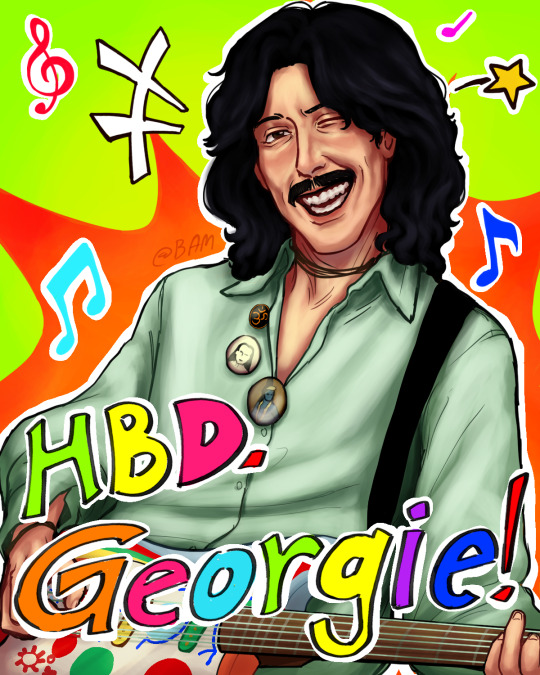
-No text version-

#Gosh i finished this in time but my internet are dead so that why i can't post it on his b-day 🧑🦽#btw#HBD!!! GEORGE HARRISON!!🥳🥳#hbd#george harrison#the beatles#beatles#the beatles fanart#art#fanart#digital art
38 notes
·
View notes
Text
with all this talk about mean girls lately it’s so funny how no one ever brings up mean girls 2
#I mean they have good reason but it’s beeen completely forgotten#I should watch tbh#anyways I saw the new movie musical in theaters#I’m so tired and need to sleep but suffice to say it was Bad. capital B#also im posting this on this blog bc Claire holt was in it! (mean girls 2)#mean girls#regina george
15 notes
·
View notes
Text
Today in Spring = Brain Goes rrrrrrrrRRRRRRRrrrrrrrrRRRRRRRrrrrrrr: I have started a close watch of the whole, uncut series so I can make a list of all the scenes (with timestamps) missing from the first five seasons on CBC Gem. I'm seeing bits I've never seen before, like Murdoch commenting that George smells like lavender. Of course he does. My beloved.
#murdoch mysteries#mmi#1x01#george crabtree#william murdoch#cbc gem#cbc murdoch#mm rewatch#some of the missing scenes are just filler like murdoch getting from point A to point B#but some of them are character development#sweet sweet character development#i am in love with these characters#i've watched this show at least five times through and most of the time I still can't tell you who the killer is#blorbos with murder mysteries going on in the background#let me know if you want the link#i'll post it eventually but not for a while
29 notes
·
View notes
Text
Darcy & Wickham backstory headcanon (1/?)
PART ONE, in which Mr Darcy (senior) meant well, but
I’ve always thought this quote from Elizabeth, about Wickham and Darcy, is really interesting:
“There certainly was some great mismanagement in the education of those two young men. One has got all the goodness, and the other all the appearance of it.”
Jane argues that this isn’t wholly accurate or just. Darcy did not ever seem devoid of goodness to her. But because the dialogue moves on without narrative comment, it’s not clear whether we should interpret this as Jane being Jane, or as a suggestion that Elizabeth has never really been fair to Darcy (which is how she takes it), or as something else.
The point about education is intriguing, though, given that this is a novel deeply concerned with the education of young people and parental failures, and that Darcy does end up attributing his flaws to his parents’ influences, but with very careful phrasing to avoid really blaming them for anything in particular, and no mention of Wickham.
This is more in the realm of headcanon than canon, but I think an interesting possibility is that ... Elizabeth is right. Maybe there was some pretty substantial mismanagement with both the younger Darcy and Wickham.
There’s no indication that Lady Anne, less amiable though she may have been, ever had much to do with Wickham. He mentions her name, but only to connect Lady Catherine to Darcy. The person who impacted both Darcy and Wickham was the late Mr Darcy, Wickham’s (allegedly) beloved godfather and Darcy’s father.
Mr Darcy was apparently a great guy: principled, upstanding, lovable, generous, kind, everything amiable. Nobody has a word to say against him apart from Darcy’s generalizations about “my parents” and their collective mistakes, and even then he stops to stress how great his father specifically was.
And yet, something went wrong.
It’s one thing with Darcy, who turned out basically okay even before his character growth. He was the heir, he was spoiled, there might be an implication that his parents taught him basic principles but kind of left him to do his own thing, insofar as that was possible. None of this is shocking for that kind of family and it doesn’t have to reflect that badly on any of them.
But there’s also Wickham, who did not turn out okay, and we don’t actually know why. According to him, he was raised at Pemberley in the mansion. He and Darcy were “objects of the same parental care” and they spent their boyhoods together. He even claims that he was often given preference over Darcy. Now, this is all coming from Wickham, who is a very dubious source, so it’s worth looking at what the other people involved have to say.
It turns out that Wickham was, indeed, raised by Mr Darcy at Pemberley (Mrs Reynolds says so). Mr Darcy had a miniature of Wickham painted, and treasured it with pictures of his own children so much that, five years after his death, Darcy still hasn’t had the heart to get rid of it despite everything Wickham has done. Darcy describes Wickham as the companion of his youth and “the acknowledged favourite of my father.” This doesn’t incontrovertibly back up Wickham’s account because “favourite” had multiple meanings and didn’t necessarily refer to parental favoritism, though it could and frequently does in P&P. At any rate, it’s not a contradiction.
That’s why this is ultimately a headcanon matter. There’s really no way to know if Wickham is lying about Mr Darcy’s favoritism because his story mixes truth, lies, and a bunch of deceptive omissions. He doesn’t tell many outright falsehoods in his story, but there are a couple, and Darcy is not clear on this point, so it’s basically up to the reader to decide which alternative they want to go with.
As for my own headcanon? I think Wickham actually is telling the truth about this, to a point.
Okay, I realize that my relentless Darcy stanning could make my judgment somewhat suspect. I do have reasons other than woobifying Darcy, though—I think that Wickham genuinely being the favorite actually fits really well into the overall backstory and explains quite a few things about them both.
So, jumping fully into headcanon land: let’s go back to 28 years before P&P. Mr Darcy and Lady Anne have been married for an unknown period of time. Her sister, Lady Catherine, is married to Sir Lewis de Bourgh, while Mr Darcy’s steward, Mr Wickham, is married to the extravagant Mrs Wickham. All three women are pregnant.
I speculated in a recent post that Lady Anne and Lady Catherine may have shared some kind of genetic issue that led to difficulties bringing pregnancies to term. We don’t know this, but we do know that Darcy was an only child for a long time (potentially the entire 12 years between him and Georgiana) and that Lady Catherine’s daughter is truly an only child. To go by the plot to unify Rosings and Pemberley through Darcy and Anne’s marriage—planned when both were infants—it doesn’t seem that the Fitzwilliam sisters expected Lady Catherine to ever have another child.
My headcanon is that both sisters had suffered multiple miscarriages by the time that Darcy and Anne were conceived, that few people around them expected these pregnancies to turn out any better, and the fact that they were able to carry both pregnancies to term, that they did so at around the same time, and that the children turned out to be a girl and a boy, looked a lot like Providence to them.
I don’t imagine either thought very much about the Wickhams’ baby at the time. But it was different for Mr Darcy.
Darcy says in his letter that he is nearly the same age as Wickham, which technically doesn’t have to mean Wickham is older, but IMO suggests it. There’s leeway here, but I imagine that Wickham is about six months older than Darcy. When he’s born, Lady Anne is already pregnant with Darcy, but neither Mr Darcy nor anybody else yet realizes she’s not going to miscarry this time.
So the birth of the Wickhams’ son is somewhat bittersweet—Mr Darcy is a genuinely kind-hearted man with considerable affection for his steward, so he’s happy for them, but doesn’t know if he himself will ever have any children. And he understands that a child will strain the Wickhams’ finances and that Mr Wickham certainly won’t be able to provide much in the way of formal education or career opportunities for this child. Mr Darcy is touched at the request to stand as godfather and eager to do whatever he can for the baby. Mr Darcy does have a lot of other things going on, but baby Wickham is extremely adorable and he wants to do more.
We don’t know when he took on responsibility for Wickham’s upbringing and it doesn’t seem like he tried to sever Wickham from his birth parents, since the Wickhams already lived at or near Pemberley. Nevertheless, Mr Darcy takes on a very big role even for a godfather, and it’s possible that he offered to raise Wickham and had significantly bonded with him before Darcy was even born.
All the while, Lady Anne’s pregnancy is progressing—perhaps with difficulties, but obviously, she makes it through and delivers a son. Mr Darcy is undoubtedly thrilled, he goes along with naming the baby after her family (I think Darcy owes his first name to Fitzwilliam pride, not Darcy tradition), and while Mr Darcy is not directly involved in the Darcy/Anne engagement plot, he’s okay with it (Wickham is actually the first to mention it in P&P, so it seems to have genuinely been accepted or at least under discussion at Pemberley). The arrival of their son is more complicated than it would otherwise have been because of baby Wickham, but obviously, Mr Darcy is capable of loving two different children and he does.
As the babies grow into young boys, though, things become even more complicated. Wickham is open, outgoing, and lively. I suspect he somewhat mimics Mr Darcy’s manners—not out of childish malevolent intent, but because that’s who his role model is as a child, and it comes to him easily. In any case, I think it’s possible that this is the sort of person that Mr Darcy prefers in general, given that at the end of his life, he ends up selecting Lady Anne’s 25-year-old younger nephew (who has a similar temperament if more intelligence and morals) to act as the executor of his will and co-guardian of his 11-year-old daughter.
But their own son is ... different.
If you’ve followed me for much time or run across many of my Darcy-centric posts, you probably already know that I am adamantly opposed to the idea that reducing all of Darcy’s social issues to his arrogance is the best reading of him, much less the only correct one. Additionally, my personal headcanon is that he isn’t shy but is neurodivergent—specifically, that he’s on the autism spectrum. This interacts with his later arrogance but does not contradict or diminish it. So that’s part of this headcanon, too.
We don’t know a whole lot about very young Darcy, but we do know that he’s four when Mrs Reynolds comes to Pemberley, and that she notices he never speaks crossly to her, even then. She seems to consider this pretty amazing in a child of that age. There seems an unspoken contrast going on there—perhaps just with other children in general, but possibly, circumstances offered a very obvious contrast in Wickham.
I’m not suggesting that four- or five-year-old Wickham was already monstrous, because that’s not the case. But given that Mrs Reynolds believes that children’s natures give a decent idea of what they’ll become as adults, and that she also believes Wickham is “wild,” I suspect that young Wickham and young Darcy struck her as very different personalities from the first, and that she preferred Darcy’s.
For Mrs Reynolds, Darcy never expressing irritation towards her, even as a tiny child, is a sign of his virtue and good nature. And certainly, that’s part of it. But it may not be the only part.
Adaptations tend to make Darcy into a visibly brooding and somber sort of person, but Elizabeth never really sees him that way. Her characterization of his usual demeanor in the first half of the book is “sedate.” Charlotte actively looks for signs of his interest in Elizabeth when they’re in Kent (interest which we know he feels), but can’t tell from his expression if he’s interested or just absent-minded. He admits that he has trouble looking interested in people he’s unfamiliar with and in catching their tone of conversation.
Even when he’s actively working to be as agreeable as is humanly possible for him at that point, with the Gardiners, there’s something about his air that strikes them as formal and lacking liveliness (though it’s not a big deal for them). He tries to compliment Mrs Bennet late in the book, and even to Elizabeth, his manner comes across as cold. Nobody guesses that something went on during his and Elizabeth’s multi-mile engagement walk, because Elizabeth’s feelings are complicated before talking to her parents and because Darcy is so inexpressive in company. Later, Elizabeth ends up shielding and guiding him through the social occasions around their engagement.
So, my headcanon is that part of the reason four-year-old Darcy doesn’t ever speak crossly to Mrs Reynolds is that he’s a sweetheart, yes, but part of it is that he has trouble translating what he feels into tone and expression anyway. Consequently, we’ve got Wickham, who is energetic and open and dramatic and charming, and then there’s Darcy, who is demonstrative through action more than demeanor.
He’s quiet, quick at his lessons, and if you’re in a position to notice, sweet and generous in a way that Wickham apparently never has been—but there’s something peculiarly stiff about Darcy’s mannerisms and how he talks (when he talks at all), even by the standards of the time. He’s off-putting to many of these eighteenth-century people around him. Towards his parents, his manner seems respectful but not all that affectionate, especially by contrast to Wickham (though in fact, Darcy idolizes his father, and loves his mother and extended family).
I think Darcy’s father may well have simply found young Wickham more endearing, more conventionally boyish, and easier to bond with. He wasn’t unkind to Darcy by any means, but he did have a stronger rapport with Wickham and this would only become more marked as they grew older and their personalities became more pronounced.
But I also headcanon that Mr Darcy felt pretty guilty about preferring Wickham to his own child—his only son and heir, no less, and at the time, his only biological child. He felt even guiltier because his preference didn’t really have anything to do with some clear misbehavior that could be addressed. And it’s not like he didn’t love him. So, far from being harsh as a father, his affection and guilt led him to over-correct his approach to his son. He indulged Darcy, and while he took care to teach him the things he considered important for Darcy to learn and carry on as his heir, he otherwise mostly gave him his way and left him to do whatever he wanted.
At the same time, he didn’t want to penalize Wickham for being more likable, so he also was indulgent towards him, and on top of that, didn’t take as many pains to impart his principles because a) Wickham seemed to have them naturally and b) Wickham wasn’t the heir.
I think B ended up being really important for the development of both of these boys in such radically different directions. Mr Darcy essentially treated Wickham like another son, but at the end of the day, Wickham was not his son. No matter how engaging, how personable, how endearing, how beloved Wickham might be, he was never going to be the heir. He’s the oldest, he’s the favorite, he’s the most likable, but Darcy is still going to get everything.
It’s not like Mr Darcy was planning on just treating his godson like another son and then leaving him out to dry. Wickham essentially gets the younger son treatment—a good education to prepare him for a career in the church that will socially make him a gentleman. I don’t think Wickham was seething with resentment over this at, you know, eight or nine years old, but it was old enough for him to understand that their expectations were very different, and all the favoritism in the world was not going to change that.
I think it’s additionally possible that Wickham’s very virtuous father, who was also in the picture in some capacity, was deeply grateful, and expected young Wickham to also be grateful. But for Wickham, the obvious point of comparison in terms of his expectations was not the children of other servants, it was Darcy.
Wickham claims in P&P that Darcy was jealous of his father’s preference for Wickham from early in life, despite their boyhood friendship. Darcy, on the other hand, says that it would have been a depravity to do nothing for Wickham because he was the favourite of Darcy’s father and had been brought up as a gentleman but was completely dependent on the Darcys. Even though Darcy thinks quite poorly of Wickham’s character by age 23, he feels obligated to do something for him and hopes, even if he can’t quite believe it, that it’ll turn out okay.
I don’t think Darcy’s reasoning here sounds at all like someone given to jealousy, honestly. I’ve seen it occasionally suggested that he is jealous of Wickham, actually, or that in some more nuanced earlier draft of P&P that he was jealous and Wickham was less awful and blahblah, but I don’t think so. I think this is where the deception on this issue lies. Wickham was indeed the favorite, but Darcy wasn’t that jealous of him. He was jealous of Darcy.
It wouldn’t be horrible if Darcy had been jealous, to be clear. It would be a very understandable emotion for a child in this situation to feel. Nevertheless, he doesn’t really seem to have been.
I think part of this is that he’s not a particularly jealous person by temperament (fandom sometimes assumes he is, but I disagree). Part is that he tends to process things in his own very particular way that doesn’t always follow the paths you would expect. But part, I think, is that while he was somewhat hurt by the situation, what jealousy he might have felt was headed off very early.
There was another important figure in all this, after all: Lady Anne.
#pay no attention to my woefully inconsistent verb tenses >_>#anghraine babbles#anghraine's headcanons#austen blogging#george wickham#fitzwilliam darcy#lady anne blogging#mr darcy senior#lady anne darcy#long post#grand unified theory of pemberley#-> will be my master tag for these posts#/#//#///#////#/////#a#b#c#d#e#pride and prejudice#jane austen#mrs reynolds#rare breed of attack unicorn#(for the autism headcanon!)#lady catherine de bourgh#mr wickham (senior)#austen fanwank
167 notes
·
View notes
Text
debate breaks out on the Jerome Horwitz playground about which came first: Captain Underpants the person or Captain Underpants the comic
#j's posts#i mean the general public doesn't know right?#group a who believes captain underpants was just in hiding until george and harold discovered him#vs group b who believes george and harold were in league with his secret identity to plant him all along#vs group c who believes george and harold *created* captain underpants somehow#manifested him with the power of belief or something idk
135 notes
·
View notes
Text
I have posted 64 hrpf works...I should do something when I hit 69 lmao. Like how the y/n girlies do little celebrations when they hit follower counts? A kasper moregraceful celebration of an arbitrary milestone
#the celebration is i leave hrpf fandom lol#and finally know peace in my life#JK WE LIVE DELICIOUSLY#the celebration is i look how i have spent my one wild and precious life#and write some weird fic#who am i kidding yo i am gonna forget and it's going to be like fic abt the oldest man on the planet and a cuda rookie#the celebration is i finish the fic i promised people last year#[staring at the jani/roope fic in the eye so as not to show fear] i am not afraid to keep on living...#i'm posting a lot but today my tasks are a) clean the living room and dining room and b) come up with prompts for 4th line grind fest#and c) do a bunch of work for a fellowship cohort i am facilitating this fall#i don't want to clean and i don't feel creative and i forget why i didn't want to do the other one but it's probably bc i had an anxiety#dream abt it#dude i had an insane dream abt george springer recently and it was like...ok kasper is this is a symptom of something#are you well? like are we good here or-#i mean really what can i say about george springer. he's so [foghorn]#fresno oiler.txt#i feel like there was a point to this post but idk what it was....sorry
12 notes
·
View notes
Text



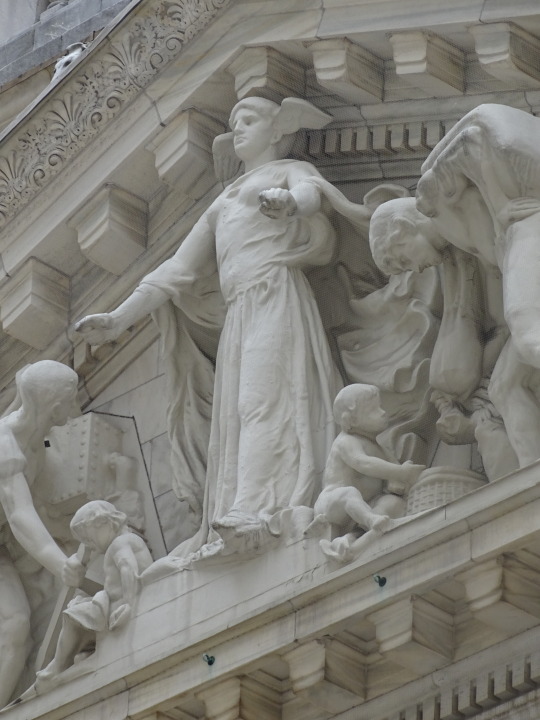



The New York Stock Exchange was founded on March 8, 1817.
#New York Stock Exchange#founded#8 March 1817#anniversary#USA#US history#Trowbridge & Livingston#George B. Post#Classical Revival#façade#summer 2018#2013#original photography#18 Broad Street#NYSE Building#New York Stock Exchange Building#John Quincy Adams Ward#Paul Wayland Bartlett#columns#balcony#flag#Lower Manhattan#New York City#architecture#cityscape#tourist attraction#landmark
0 notes
Text
shake your hand in character ft. flashback joe iconis, cyril von miserthorpe, krampus, the fancy tree, mister macabee, quince, little evalina, debra neezer jolie, flashback joe jr., flashback mama, poinsettia, hot candy, clouds, santa, aunt lorette, rufus?
#bass boosting & blurring visuals as i go Aunt Lorette....what's next a rare peenie w/o the islanders jacket orange glasses#listening intently under the [clouds] handshake like his beloved aunt lorett(e) it does sure sound like. uncle giuseppino#who has to reveal the uncle peenie nickname b/c present tense joe finds his toddler self's mispronunciation embarrassing or what have you#opposite of posts like ''it must be so hard to be 70 yrs old a toddler calls you peepaw & that's your name for the rest of your life''#anyways maybe i misheard it Once & have been aunt lorettaing ever since lmao#haven't technically heard that many actual auditory uncle peenie aunt lorette/a intros#in fact sure could be spelling it like uncle pini or such the whole time but a) peenie's funnier; relevant; more obvious outside context#& b) it's like a toddler's mispronunciation so that justifies a like artistic / poetic translation choice there lol#joe iconis christmas extravaganza#cyril von miserthorpe#will roland#i was also wondering why giovanny's costume looked so similar to flashback joe abf's....well because he is flashback joe junior!!#whose flashback daddy was Not killed by flashback mama#ft. many others....thrown by [clouds? thought that was the personification of Hope] but other things are new/unknown to me ofc!#little evalina is the role who does not speak until singing all i want for christmas is you btw. last time ft. george as little evalino#or referenced in the extensively phyllidia krampus fancy tree featuring video there as The Silent Child whom will be made a Quiet Stew#hang in there rufus#quince not bringing up the eternal onehandedness ft. carrying it around lol....#oh hang on i bet i know what happened re: [was it aunt lorette the whole time] w/pertinent grammatical choices here already#hearing them introduced & outroduced as Aunt Lorette And Uncle Peenie & rebracketing Lorette And into LorettaAnd
8 notes
·
View notes
Text
and the trees stand
a wind has blown the rain away and blown
the sky away and all the leaves away,
and the trees stand. I think i too have known
autumn too long.
e. e. cummings
day one: the universal problem / au
rating: pg
words: 900
───────────────────────────
The wind cries around the corners of the house, rattles the windows, moans in the chimney in the room next to hers, and Lucy stares up at the ceiling. As if falling asleep on threadbare carpet in an abandoned house along a back-country road wasn’t going to be hard enough on its own, the wind had to pick up, and so despite the salt lines she laid down her ears are straining to hear something else.
She scrunches down in her sleeping bag, trying to cover her ears. Her usual method of fortifying the single room she’s in has certainly stretched out her salt supply, but it means her imagination likes to run wild. Currently it’s picturing ghosts drifting into the other rooms and building up against the invisible line, their forms melting into each other as they press against it, trying desperately to find the smallest break they can force themselves through…
Downstairs, the front door bangs open. She sits up and puts her hand on her iron bar, heart beating in her throat. Adrenaline floods her bloodstream as a real voice echoes through the huge front hall, not quite loud enough for her to pick out actual words. She picked this house partially because it was so big: they’re harder to defend. What person on their own would chance it? At least two, she thinks bitterly. Maybe they’ll stay downstairs? Or maybe it’s one crazy person talking to himself.
The door slams shut. The voice continues speaking, a rapid cadence… a frantic one, she thinks after a moment. And a young one. And then she hears, far too clearly: “No, stay awake!” Her heart constricts as her stomach goes sour.
She stays where she is for another moment of frozen indecision, and then she groans and stands. Whatever is happening, she can’t stay here and half-listen. She opens the door, breaking her salt line, and brandishes the bar. No ghosts have built up in the room beyond. The frantic voice ceases abruptly, and then calls out a blustering, “Hello?”
“Flesh and blood,” she calls back, heading down the short hallway to the walkway open to the front hall. No ghosts accost her and she makes it quickly to the walkway. She doesn’t dare put weight on the banister as she looks down.
A tall thin boy in a long black coat is standing a few stairs up raising a faint lantern, illuminating his face better than hers or the house around them. His hollow face is smudged all over with what she can’t tell, making his age hard to pinpoint, but beneath his sunken eyes it’s even more smeary. He’s breathing heavily and holding his own iron bar; it’s raised aggressively, despite his whole arm trembling with the effort. All she can make out of the person on the stairway behind him is curly dark hair on one end and muddy jeans and trainers on the other. A voice too low and uneven for her to guess gender says, “La’wood?”
“It’s all right, George,” says the boy without looking away from her. “I’ll sort it.”
“Is he all right?” Lucy asks.
“He’s-” The boy cuts himself off and swallows hard. “No. He’s-” He blinks rapidly and swallows again, shifting on his feet as if that will hide how he’s swaying in place. “He’ll be fine,” he says, trying to be firm and assured but betrayed by his choked voice and darting dark eyes. “He just-”
“For God’s sake,” Lucy interrupts, starting around the walkway for the stairs. She slides her iron bar into her belt and keeps it there with a loop of twine. “Come on, let’s get him up here. I’ve got a salt line all around a room.”
“He’ll be fine,” the boy repeats. “He wasn’t ghost touched, we had to run and he fell down a ditch and hit his head, but- he’ll be all right.”
Now that Lucy’s come down the stairs she can see the boy a little better. He’s taller than her by more than she thought, and so thin and shaky it looks as though the wind still banging the shutters could blow him over. The ends of his black coat are stiff with mud and his trousers are more mud than fabric; God only knows what color his trainers are under all the drying brown. George’s hair is matted with mud on one side and he has glasses that are currently resting cockeyed on his nose. He mutters something she can’t make out.
“I’m… not,” the boy protests feebly, only now lowering his iron bar. “I’m…” He swallows again and rubs the back of his hand across his mouth. “I’m sorry,” he says. “It’s… been a night.” He tries to smile. She forgets for a moment how filthy he is because it’s such a lovely smile. He sets aside his iron bar and offers her his right hand after wiping it on his coat. “I’m Anthony Lockwood.”
“Lucy Carlyle.”
He gestures to the boy behind him, then crouches and takes his left arm. “This is George Karim.” George mumbles something that might be ‘pleased to meet you’ and half-waves a hand in her direction.
“Hello George.” She steps carefully to George’s other side to take his right arm and smiles back at Anthony. “Let’s get him upstairs, shall we?”
He smiles a little wider, making her heart flutter. “Yes, please.”
───────────────────────────
shoutout to my new job for not sapping all my energy, @dangerously-human for getting me into lockwood & co, and @lco-angst-week for setting this thing up 🤍
thoughts on this au that didn't make it into the fic: ghosts multiplied faster than in canon, children and young people are still the only ones who can sense them, and thus society has largely broken down. it's not quite a lord of the flies situation where the kids are on their own, but... it's not not that either. i imagined little pockets of people struggling along in the country and cities being mostly abandoned bc of all the ghosts, small older towns only being better off in terms of smaller graveyards to fence off. where is lucy going? why are lockwood and george out in the middle of nowhere? there i can't help you. they're just. going. and meet up, and team up, and their lives are all changed for the better no more questions please 🧡
#lockwood & co angst week#lockwood and co#tv shows#alternate universes#fanfic#mine#lucy carlyle#my favorite#anthony lockwood#you pierce my soul#george karim#all my favorites#it was very odd to have lucy refer to lockwood as 'anthony' even tho a. it's just in her narration and b. maybe he DOES go by anthony here#i mean. it's not like he has a business in This post apocalypse england#anyway#writing is hard#my muse is a monster#abbie writes a thing
19 notes
·
View notes
Text
fire and blood is a controversial text to say the least and there's plenty of cringe shit in it but for me it is entirely, fully redeemed with the footnote that reads like *robar baratheon never married again
rhaena the lesbian saying "you impregnating my mother, at her age, despite already having heirs was MURDER" is everything to me! as a tudor fan, the fertility issues of katherine of aragon, anne boleyn, and then the death in childbirth of jane seymour is all... very typical, for much of history. women having children too young, too old, or too many, contributing to pain and suffering and death. and george called it MURDER. "her blood is on your cock"
demanding those last two children of alyssa be raised well and given good marriages, threatening robar to NEVER do that again to any other poor woman. him furiously threatening her, only for the footnote to reveal he never did marry again. he was cowed! it worked!
the book is bad sometimes (daenaera velaryon world's most beautiful 6 yr old) but other times. it is so good. i will keep coming back to the well of george
#Fire and Blood#Oh also the main books talking about Good King Jaehaerys#And then in F&B he sucks and is the worst and Alysanne did every good thing he was credited for#Thank you George I take that at face value. Fuck Jaehaerys I agree w that post that he was. Inappropriate w his daughters
6 notes
·
View notes
Text
braiding my love
Handlemewithcare
George Harrison/Ringo Starr
Rating G
F/F
Ringo braids Georgie’s hair just like every day. But today isn’t an ordinary day and Ringo has just the gift for Georgie’s birthday.
#for george's b day#a cute little story (and yes they're lesbians)#george harrison#ringo starr#starrison#fanfiction#*mine#forgot to post it last night
3 notes
·
View notes
Note
what do you think about sunfyre and his bond with aegon
for me it's the only thing i like about aegon lmao , sunfyre was a good loyal dragon who deserved better than to die young and broken
usually I try not to think about it because I see so much discourse about it it's kinda insane 💀
I think all the dragons have bonds with their rider. Syrax-Rhaenyra, Helaena-Dreamfyre, Caraxes-Daemon and all the rest.
in the show we see Syrax react to Rhaenyra's pain while giving birth to Visenya, in the book Dreamfyre senses when Helaena dies. And Sunfyre did admittedly have his moments as well.
When he was making his way to dragonstone Gyldayn believed it was due to a primal instinct for Sunfyre to return to his birthplace. This isn't far stretched because this theory has been seen before about other dragons in f&b pre-dance (for instance the black dread and the rumor he went to old valyria aka his birthplace). On the other hand, in the book it's also suggested Sunfyre might have been able to feel Aegon II's urgent need of him.
Personally I think it might have been a mix of both. Sunfyre was extremely injured and couldn't even fly if I remember correctly so it makes sense that he'd want to be back to his birthplace where he felt most safe. On the opposite, I'm a firm believer of dragons sensing their riders emotions so I won't pretend Aegon being in dragonstone didn't play a role.
If anything he probably wanted both and was lucky they were all in the same place.
The competition I've seen in the fandom about "who has the best bond" is quite ridiculous in my humble opinion because we never get the opportunity to see much of the other dragons with their rider (aside being in a battle)
and because I know my girl Syrax will inevitably catch strays as usual, let me disclaimer. George needed a way to get rid of her because if rhaenyra went to dragonstone with Syrax aegon and his soldiers would be doomed (Sunfyre was way too injured to fight and couldn't fly). And because Rhaenyra had to die George found the quickest, stupidest way to off Syrax so pls leave her alone. Take the anger to that man
Now to bring it back and be controversial (because of course I have to be), a common argument I've seen is how aegon after the war wants to claim another dragon, a "better" Sunfyre. Is he a bit of a bitch about this? yes. But also consider the fact that dragons are a symbol of power, I don't think him wanting another dragon means he didn't give a fuck about Sunfyre, rather he had become disabled, slowly paranoid with whom he could trust and who is better and more powerful to have on your side than a dragon?
#ask reply#aegon ii targaryen#canon aegon ii targaryen#I know I brought up the birth scene as an example but the post is mostly about f&b#also to defend Syrax 'cause my boo is always in discourses#Joffrey was DUMB for trying what he did with Syrax. Did he pay no attention to his valerian lessons?#“but Silver he was a child” yeah and a dumb one.#he wanted to save the dragons. Kudos for that. But after all the shit is happening you'd expect to find a better way than this 💀#again. I blame it on George. He didn't want rhaenyra to fight in the sky but he also wanted Syrax to magically disappear#anyways I'm team black here so I can't help defending them but it's genuinely dumb the stretch I see ppl do to claim that Sunfyre and aegon#didn't have a bond like every single rider/dragon did
6 notes
·
View notes